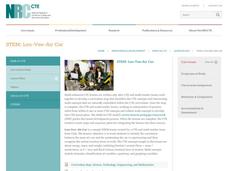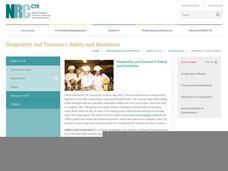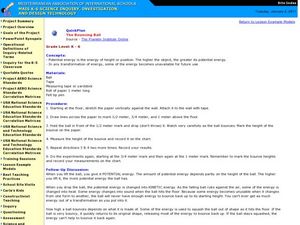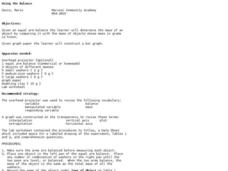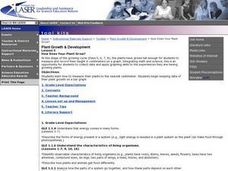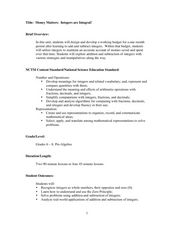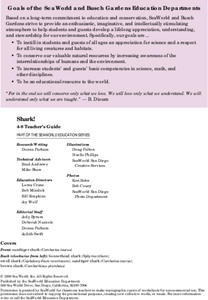National Research Center for Career and Technical Education
STEM: Lou-Vee Air Car
A comprehensive activity on acceleration awaits your physicists and engineers! Two YouTube videos pique their interest, then sample F=ma problems are worked and graphed. The highlight of the activity is the building of a Lou-Vee air car!...
National Research Center for Career and Technical Education
Hospitality and Tourism 1: Safety and Sanitation
Math and science come alive in this career-related lesson plan on sanitation. Along the way, learners explore bacterial growth rates using exponential notation and graphs. A link to a very brief, but vivid video shows just how quickly...
Curated OER
Use Google Maps to Teach Math
Capture the engagement of young mathematicians with this upper-elementary math lesson on measuring time and distance. Using Google Maps, students first measure and compare the distance and time it takes to travel between different...
Curated OER
Ornithology and Real World Science
Double click that mouse because you just found an amazing lesson! This cross-curricular Ornithology lesson incorporates literature, writing, reading informational text, data collection, scientific inquiry, Internet research, art, and...
Environmental Protection Agency (EPA)
The Case of the Mysterious Renters
Upper-elementary kids examine the water usage in their own home, then use that data to solve a case in which a landlady is trying to determine how many people are living in an apartment being rented. Combine math, scientific method, and...
National Research Center for Career and Technical Education
Health Science: Back to Basics
This lesson focuses on unit conversion, proportions, ratios, exponents, and the metric system. Discuss measurement with your math class and demonstrate how to solve several health-science word problems. Give learners a chance to visit an...
Curated OER
The Bouncing Ball
Students use the scientific method to conduct an experiment to test how a ball bounces. In this inquiry-based physical science and scientific method activity, students drop a ball from specified heights and record the rebound, then...
Curated OER
Using the Balance
Students determine the mass of various objects. In this integrated math and science lesson plan, students use an arm balance to compare a known object to a combination of washers with a fixed weight. Students record data, construct a bar...
Cornell University
Scaling Down: Effects of Size on Behavior
Two activities explore the concept of size, especially small sizes down to the nano. Scholars practice determining volume, mass, and density and calculate exponential increases and decreases. They then predict and test the effect of size...
Baylor College
Lungometer
Life science learners construct lung-o-meters from gallon-sized milk jugs and then measure their lung capacities. For older students, have them graph the vital lung capacities of each person in the class. Cross-curricular pieces are...
Curated OER
The Integration of Science and Math Through Ecosystems
Students use the disciplines of math and science to examine ecosystems. In groups, they calculate the amount of supplies they would need to live in the classroom for one day, a week and a year. Using this information, they apply it to...
Curated OER
How Does Your Plant Grow?
Students measure and record their height in centimeters on a graph. By integrating math and science, students collect data and apply graphing skills to the experiences they are having growing plants. Finally, students identify how to...
National Security Agency
Money Maters: Integers are Integral!
A thoroughly-written lesson plan and a plethora of worksheets about integers comprise this resource. Neophyte number crunchers learn to recognize integers, add and subtract them, and apply the concepts to the designing of a personal...
Minnesota Department of Natural Resoures
Minnesota’s Forests
The forests of Minnesota provide middle schoolers with an integrated learning opportunity. They examine the three biomes and their histories, conduct experiments, read stories, and draw pictures. A lovely lesson about trees.
Disney
Where Do Brown Bears Live?
What do brown bears in Alaska's Katmai National Park need to survive? Pupils explore the unique habitats, diet, and survival needs of this animal. They predict the consequences of removing any integral part of the bear's survival,...
SeaWorld
Shark!
Here is an impressive collection of lessons on sharks. In them, pupils undertake a serious study of sharks, their habitats, their social structure, and how humans adversely impact their existence. These lessons effectively integrate...
Curated OER
How to Build an Electric Motor
Sixth graders build a working motor. In this lesson on motors, 6th graders use an inquiry method of learning to discover how to create a working electric motor with the supplies given to them. The teacher will guide them as needed....
Curated OER
Applied Science - Science and Math Pre - Lab (Scientific Method)
Students examine science. In this scientific method lesson, students are introduced to what every experiment contains (hypothesis, critical thinking) and how an experiment is conducted. They watch a demonstration and then work...
Education World
Thinking About Thanksgiving: Lessons Across the Curriculum
Bring two integrated curriculum resources about Thanksgiving to an elementary social studies unit. The first activity focuses on Squanto's contributions to the early Pilgrims' survival with a gardening activity in which learners add...
Curated OER
How Does Your Garden Grow?
Students construct and maintain a school garden. In this gardening instructional activity, students plan the construction of the garden by writing letters to local businesses asking for supplies and materials; students build the garden...
Baylor College
Heart and Lungs
With a partner, youngsters measure their pulse and breathing rates, both at rest and after running in place for a minute. While this activity is not novel, the lesson plan includes a large-scale classroom graphing activity and other...
Baylor College
Dust Catchers
In class, your emerging environmentalists construct dust catchers. They take them home for a week or two, and then bring them back into class to examine under a magnifier. From this activity, they learn what makes up dust and that...
Baylor College
Moving Air
In lab groups, young scientists place aluminum cans with a bubble-solution cap into different temperatures of water to see what size of bubble dome forms. As part of an atmosphere unit in preparation for learning about convection...
Baylor College
Can Nutrients in Water Cause Harm?
Ecology candidates culture pond water organisms over a few days time, then they experiment to find out how increasing nutrients affects the population. As part of a unit on water, this exploration gives your class an understanding of how...
